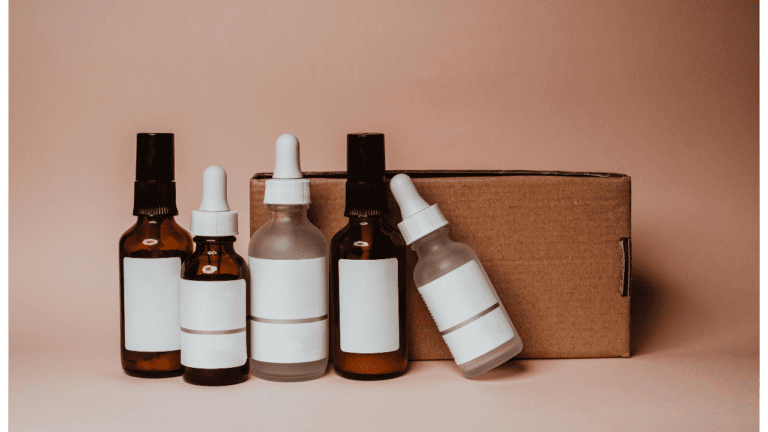Vitamin C serum is a popular skincare product that has been gaining popularity in recent years. It is known for its ability to brighten skin, reduce dark spots, and boost collagen production. However, many people are unsure about whether vitamin C serum is supposed to be oily or not.

The answer to this question is not straightforward. Vitamin C serums can come in a variety of textures, from thin and watery to thick and oily. The texture of the serum depends on the formulation and the concentration of vitamin C. Some serums may contain other ingredients that can make them feel more oily, such as vitamin E or hyaluronic acid.
For those with oily skin, using an oily vitamin C serum may seem counterintuitive. However, oily serums can still be beneficial for oily skin types. Many oily serums are lightweight and absorb quickly into the skin, leaving behind a matte finish. Additionally, some oily serums contain ingredients that can help regulate sebum production and reduce the appearance of pores.
Understanding Vitamin C Serum

Vitamin C serum is a popular skincare product that is known for its many benefits for the skin. It is a topical treatment that contains a high concentration of vitamin C, also known as ascorbic acid. This serum is often used to brighten the skin, reduce hyperpigmentation, and fight the signs of aging.
Components of Vitamin C Serum
Vitamin C serum is made up of a few key components, including ascorbic acid, water, and other ingredients that help to stabilize the vitamin C. The concentration of ascorbic acid in the serum can vary, with some products containing as little as 5% and others containing as much as 20%.
Role of Vitamin C as an Antioxidant
One of the main benefits of vitamin C serum is its ability to act as an antioxidant. Antioxidants are molecules that help to protect the skin from damage caused by free radicals. Free radicals are unstable molecules that can damage cells, leading to premature aging and other skin problems.
Benefits of Vitamin C in Skincare
Vitamin C has a number of benefits for the skin, including:
- Brightening: Vitamin C can help to brighten the skin by reducing the appearance of hyperpigmentation and dark spots.
- Anti-aging: Vitamin C can help to reduce the appearance of fine lines and wrinkles by promoting collagen production.
- Hydration: Vitamin C can help to hydrate the skin, leaving it feeling soft and smooth.
Overall, vitamin C serum is a powerful skincare product that can help to improve the appearance of the skin. It is important to choose a product that contains a high concentration of ascorbic acid and to use it consistently for best results.
Serum Consistency and Texture

Characteristics of Serums
Serums are a popular skincare product due to their lightweight texture and quick absorption. They are thinner in consistency than creams and lotions, making them ideal for layering under moisturizers. Serums are designed to penetrate the skin deeply and deliver active ingredients like vitamin C to the targeted areas. They are typically water-based and contain a higher concentration of active ingredients than other skincare products.
Texture Variations Among Serums
Serums can come in different textures, including oily, watery, and gel-like. Some serums may feel oily due to the presence of carrier oils, which are often added to serums to help deliver the active ingredients to the skin. The carrier oils can vary in texture, from light and non-greasy to heavy and oily.
However, not all serums are supposed to be oily. Vitamin C serums, for example, are typically formulated to be lightweight and non-greasy. The texture of a serum can also vary depending on the brand and formulation. It is important to read the label and product description to determine the texture of the serum before purchasing.
In terms of hydration, serums are designed to provide a boost of hydration to the skin. However, not all serums are formulated to be hydrating. Some serums, like vitamin C serums, are designed to brighten and even out the skin tone rather than provide hydration. It is important to choose a serum that fits your specific skincare needs.
Overall, serums can come in a variety of textures and consistencies. While some serums may feel oily, others are designed to be lightweight and non-greasy. It is important to choose a serum that fits your specific skincare needs and to read the label and product description to determine the texture of the serum before purchasing.
Factors Influencing Serum Texture

When it comes to vitamin C serums, the texture can vary from watery to oily. The texture of a serum can be influenced by several factors, including the oil content in serums and the vitamin C derivatives and serum formulation.
Oil Content in Serums
The oil content in a serum can affect its texture. Serums with a higher oil content tend to have a thicker, more oily texture, while serums with a lower oil content tend to be more watery. Some serums contain no oil at all and are completely water-based.
Vitamin C Derivatives and Serum Formulation
The type of vitamin C derivative used in a serum and the serum formulation can also affect its texture. For example, ascorbyl palmitate and tetrahexyldecyl ascorbate are oil-soluble vitamin C derivatives that are often used in serums. Serums that contain these derivatives may have a more oily texture. On the other hand, magnesium ascorbyl phosphate is a water-soluble vitamin C derivative that is often used in serums. Serums that contain this derivative may have a more watery texture.
The concentration of vitamin C in a serum can also affect its texture. Serums with a higher concentration of vitamin C may be thicker and more oily, while serums with a lower concentration of vitamin C may be more watery.
Other ingredients in a serum can also affect its texture. For example, vitamin E, niacinamide, ferulic acid, and hyaluronic acid are often added to serums. These ingredients can affect the texture of the serum and can also provide additional benefits for the skin.
It is important to note that oxidation can also affect the texture of a serum. Vitamin C is an unstable ingredient that can oxidize over time, which can affect the texture and efficacy of the serum. To prevent oxidation, it is important to store vitamin C serums in a cool, dark place and to use them within their expiration date.
In conclusion, the texture of a vitamin C serum can be influenced by several factors, including the oil content in serums and the vitamin C derivatives and serum formulation. It is important to choose a serum that is appropriate for your skin type and to store it properly to ensure its efficacy.
Identifying Quality Vitamin C Serums

Vitamin C serums are a popular skincare product for their ability to brighten the complexion, reduce fine lines and wrinkles, and protect the skin from harmful environmental factors. However, not all Vitamin C serums are created equal. It is important to identify quality Vitamin C serums to ensure that you are getting the most out of your skincare routine.
Packaging and Stability
One of the most important factors to consider when identifying quality Vitamin C serums is packaging and stability. Vitamin C is notoriously unstable and can easily degrade when exposed to light and air. Therefore, it is important to look for serums that are packaged in opaque packaging to protect the Vitamin C from light. Additionally, serums that come in a pump bottle are preferred over dropper bottles, as dropper bottles expose the serum to air every time they are opened, which can lead to oxidation and degradation of the Vitamin C.
Optimal Concentration and pH Levels
Another important factor to consider when identifying quality Vitamin C serums is the concentration and pH levels. According to SkinCeuticals C E Ferulic, a potent Vitamin C serum should contain at least 15% L-ascorbic acid, the most effective form of Vitamin C. Additionally, the serum should have a pH level between 2.0 and 3.5 to ensure optimal stability and efficacy.
One example of a quality Vitamin C serum is PCA Skin C-Quench Antioxidant Serum. This serum contains 15% Vitamin C potency and a pH level of 3.0-4.0, making it a stable and effective option for brightening and protecting the skin.
In conclusion, when identifying quality Vitamin C serums, it is important to consider packaging and stability as well as optimal concentration and pH levels. By keeping these factors in mind, you can ensure that you are getting the most out of your skincare routine and achieving the best possible results for your skin.
Skin Type Considerations
When choosing a vitamin C serum, it is important to consider your skin type to ensure that it works effectively and does not cause irritation.
Vitamin C Serum for Oily Skin
For people with oily skin, it is important to choose a vitamin C serum that is lightweight and non-greasy. Look for a serum that has a water-based formula and a low concentration of vitamin C, such as 10% or less. This will help prevent the serum from clogging pores and causing breakouts.
Some vitamin C serums for oily skin may also contain additional ingredients, such as salicylic acid, which can help to control oil production and reduce the appearance of pores.
Adaptation for Sensitive Skin
For people with sensitive skin, it is important to choose a vitamin C serum that is gentle and non-irritating. Look for a serum that has a low concentration of vitamin C, such as 5% or less. This will help reduce the risk of redness and irritation.
It is also important to choose a serum that does not contain any harsh ingredients, such as alcohol or fragrances, which can further irritate sensitive skin.
In addition, people with sensitive skin should patch test the serum before using it on their face. Apply a small amount of the serum to the inside of the wrist or behind the ear and wait 24 hours to see if any irritation or redness occurs.
Overall, choosing the right vitamin C serum for your skin type can help improve the appearance of your skin without causing irritation or compromising your skin’s barrier function.
Application and Usage
Incorporating Vitamin C Serum into Skincare Routine
Vitamin C serum can be a valuable addition to a regular skincare routine. It is recommended to use vitamin C serum after cleansing and toning the skin. A patch test is recommended before incorporating vitamin C serum into the skincare routine to ensure that the product is suitable for the skin type.
Once the patch test is successful, apply a small amount of vitamin C serum to the face and gently massage it into the skin, allowing it to absorb fully. This should be followed by a moisturizer that suits the skin type.
When to Apply Vitamin C Serum
Vitamin C serum is best applied in the morning after cleansing and toning the skin. It is important to wait a few minutes for the serum to absorb into the skin before applying any subsequent skincare products. This will ensure that the serum is fully absorbed and can work effectively.
It is also important to note that vitamin C serum should always be followed by a broad-spectrum SPF of at least 30. This will protect the skin from harmful UVA and UVB rays, which can cause damage to the skin and accelerate the aging process.
Incorporating vitamin C serum into a regular skincare routine can provide numerous benefits, including anti-aging effects and sun protection. By following the recommended application and usage guidelines, individuals can ensure that they are getting the most out of their vitamin C serum and achieving healthy, glowing skin.
Potential Side Effects and Precautions
When using a vitamin C serum, it is important to be aware of potential side effects and take precautions to prevent adverse reactions.
Common Side Effects
Some users may experience mild side effects when using vitamin C serum, such as skin irritation, redness, and dryness. These side effects are usually temporary and can be minimized by using the serum as directed and gradually increasing usage over time.
In some cases, vitamin C serum can cause inflammation or discoloration of the skin. If this occurs, it is important to discontinue use and consult with a dermatologist.
Preventing Adverse Reactions
To prevent adverse reactions, it is important to choose a high-quality vitamin C serum and follow the manufacturer’s instructions for use. Users should also patch test the serum on a small area of skin before applying it to the face.
Those with sensitive skin or a history of allergic reactions should consult with a dermatologist before using vitamin C serum. It is also recommended to avoid using vitamin C serum in combination with other active ingredients, such as retinol or alpha-hydroxy acids, as this can increase the risk of adverse reactions.
Overall, while vitamin C serum can provide great results for the skin, it is important to use it safely and carefully to avoid any potential side effects.
Complementary Products and Ingredients
Vitamin C serum is a popular skincare product that is known for its antioxidant properties and its ability to brighten and even out skin tone. While it can be used on its own, it can also be combined with other complementary products and ingredients to enhance its effects.
Synergistic Effects with Other Antioxidants
Vitamin C is a powerful antioxidant that can help protect the skin from damage caused by free radicals. It can also work synergistically with other antioxidants like vitamin E and ferulic acid to provide even greater protection. When used together, these antioxidants can help to neutralize a wider range of free radicals and provide more comprehensive protection for the skin.
Avoiding Conflicts with Other Skincare Ingredients
While vitamin C can work well with other antioxidants, it is important to be cautious when combining it with other skincare ingredients. For example, vitamin C can be destabilized by certain ingredients like retinoids and AHAs, which can reduce its effectiveness. It is also important to avoid using vitamin C at the same time as products that contain niacinamide or salicylic acid, as these ingredients can reduce the absorption of vitamin C.
In general, it is best to apply vitamin C serum to clean, dry skin before applying any other products. If using other products like moisturizers or sunscreen, it is important to wait a few minutes after applying the vitamin C serum to allow it to fully absorb into the skin before applying other products on top.
Overall, vitamin C serum can be a valuable addition to any skincare routine, but it is important to use it in conjunction with other complementary products and ingredients to maximize its benefits. By combining vitamin C with other antioxidants and avoiding conflicts with other skincare ingredients, it is possible to achieve healthier, brighter, and more even-toned skin.
Evaluating the Efficacy of Vitamin C Serum
Vitamin C serum is a popular skincare product that is known for its antioxidant properties and ability to promote collagen production. However, some people may wonder if vitamin C serum is supposed to be oily. The answer is that it depends on the formulation of the serum. Some vitamin C serums may contain oils, while others may not.
Visible Improvements and Timeline
When evaluating the efficacy of vitamin C serum, it is important to consider the visible improvements and timeline. According to Cleveland Clinic Health Essentials, vitamin C serum can protect the skin from damage and promote collagen production, which can help reduce the appearance of fine lines and wrinkles. However, it may take several weeks or even months of consistent use to see visible improvements in the skin.
Clinical Studies and Expert Opinions
Clinical studies have shown that vitamin C can have a positive effect on the skin. According to a study published in the Indian Dermatology Online Journal, vitamin C has been shown to improve skin texture, reduce the appearance of fine lines and wrinkles, and protect the skin from UV damage. Additionally, experts recommend using a vitamin C serum that contains at least 10% L-ascorbic acid, which is the most effective form of vitamin C for the skin.
In conclusion, vitamin C serum can be an effective skincare product for improving the appearance of the skin. When evaluating the efficacy of vitamin C serum, it is important to consider the visible improvements and timeline, as well as clinical studies and expert opinions.
Frequently Asked Questions
What are the benefits of using Vitamin C serum for oily skin?
Vitamin C serum can help oily skin by providing hydration without clogging pores. It can also help control excess oil production and reduce the appearance of pores. Additionally, Vitamin C serum can brighten the skin and even out skin tone.
How should a Vitamin C serum feel on the skin, and what consistency is ideal?
A Vitamin C serum should feel lightweight and absorb quickly into the skin. It should not feel heavy or greasy. A water-based serum is ideal for oily skin as it is lightweight and non-greasy.
Can Vitamin C serum help with acne-prone skin, and which types are recommended?
Yes, Vitamin C serum can help with acne-prone skin by reducing inflammation and redness. It can also help fade acne scars and prevent future breakouts. A water-based serum with a low concentration of Vitamin C is recommended for acne-prone skin.





